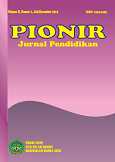ANALYZING STUDENT MOTIVATIONS FOR SELECTING PGMI AS THEIR MAJOR
DOI:
https://doi.org/10.22373/pjp.v13i3.25077Keywords:
Motivation, PGMI, TeacherAbstract
This study examines the motivations behind students’ choices to pursue a major in Primary Islamic Education Teacher Training (PGMI) at the Faculty of Tarbiyah and Teacher Training, UIN Ar-Raniry Banda Aceh. PGMI aims to prepare graduates with competencies in foundational Islamic education and child development, equipping them to be creative, productive, and independent educators. Given the varied internal and external motivations influencing student decisions, understanding these motivations is essential, as they play a crucial role in academic success and career satisfaction. Accurate choice of major can significantly impact student achievement and future opportunities, while an inappropriate choice may hinder career potential. Employing a quantitative, descriptive-exploratory approach, this study seeks to answer the question, "What motivates students to choose PGMI as their major?" Participants included PGMI students from the 2019 cohort at UIN Ar-Raniry Banda Aceh. Data collection involved questionnaires and observations, with results analyzed through descriptive statistics. Findings revealed two primary motivational factors influencing students’ choice of PGMI: (1) a strong aspiration to become teachers and (2) respect for parental expectations. This research contributes insights into student motivation, supporting universities in aligning programs with student interests and career goals.
Keywords: Student Motivation, Madrasah Ibtidaiyah Teacher Education, PGMI, Major Selection, Faculty of Tarbiyah and Teacher Training, UIN Ar-Raniry, Career Motivation
References
Ali, M. Makhrus. “Metodologi Penelitian Kuantitatif Dan Penerapan Nya Dalam Penelitian.” JPIB: Jurnal Penelitian Ibnu Rusyd 1, No. 2 (2022): 1–5.
Hayati, Mardiyah. “Motivasi Mahasiswa Memilih Program Studi Pgmi Fakultas Agama Islam Universitas Muhammadiyah Mataram Tahun Akademik 2021/2022.” El-Afaq; PROSIDING FAI 1, No. 1 (2022). Https://Journal.Ummat.Ac.Id/Index.Php/Pfai/Article/View/10934.
Husaini, Rusdiana. “Motivasi Mahasiswa PGMI Dalam Memilih Jurusan PGMI Fakultas Tarbiyah Dan Keguruan IAIN Antasari Banjarmasin.” Institut Agama Islam Negeri Antasari, 2015.
Jannah, Saniatu Nisail, Dan Uep Tatang Sontani. “Sarana Dan Prasarana Pembelajaran Sebagai Faktor Determinan Terhadap Motivasi Belajar Siswa.” Jurnal Pendidikan Manajemen Perkantoran 3, No. 1 (2018): 210.
Kisbiyanto, Kisbiyanto. “Manajemen Pengembangan Kurikulum Sistem KKNI Di PGMI.” Quality 4, No. 2 (2016): 387–414.
Priyotamtama, P. Wiryono. Buku Ajar Pendekatan Ilmiah Lanjut: Menumbuhkan Daya Imaginasi Mahasiswa. Vol. 2. Sanata Dharma University Press, 2020. Https://Books.Google.Com/Books?Hl=Id&Lr=&Id=Uwrudwaaqbaj&Oi=Fnd&Pg=PA9&Dq=Buku+Ajar+Pendekatan+Ilmiah+&Ots=P6Ysa7fEPt&Sig=Dkrmnlhovjz8nywrwyzipw_Ddaw.
Semiawan, Conny R. Metode Penelitian Kualitatif. Grasindo, 2010. Https://Books.Google.Com/Books?Hl=Id&Lr=&Id=Dspalxugucuc&Oi=Fnd&Pg=PA2&Dq=Metode+Penelitian+Kualitatif+&Ots=_AQ3ADFRSX&Sig=Htnogmjjitxzysvnusgvzn70vp0.
Sholikhah, Amirotun. “Statistik Deskriptif Dalam Penelitian Kualitatif.” Komunika: Jurnal Dakwah Dan Komunikasi 10, No. 2 (2016): 342–62.
Waluya, Bagja. Sosiologi: Menyelami Fenomena Sosial Di Masyarakat. PT Grafindo Media Pratama, 2007.
Https://Books.Google.Com/Books?Hl=Id&Lr=&Id=Pgxmsw9emc0c&Oi=Fnd&Pg=PA4&Dq=Sosiologi+Menyelami+Fenomena+Sosial+Di+Masyarakat&Ots=0placpmtln&Sig=J1z18amqrgv5mbouapyli-Ewb4e.
Downloads
Published
Issue
Section
License
- Authors retain copyright and grant the journal right of first publication with the work simultaneously licensed under a Creative Commons Attribution License that allows others to share the work with an acknowledgment of the work's authorship and initial publication in this journal.
- Authors are able to enter into separate, additional contractual arrangements for the non-exclusive distribution of the journal's published version of the work (e.g., post it to an institutional repository or publish it in a book), with an acknowledgment of its initial publication in this journal.
- Authors are permitted and encouraged to post their work online (e.g., in institutional repositories or on their website) prior to and during the submission process, as it can lead to productive exchanges, as well as earlier and greater citation of published work (See The Effect of Open Access).

